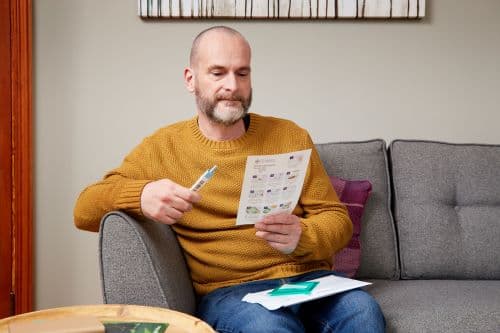Tests and scans
FIT (Faecal Immunochemical Test) is a test that looks for blood in a sample of your poo. It looks for tiny traces of blood that you might not be able to see, and which could be a sign of cancer.
Traces of blood in your poo can be caused by other medical conditions and doesn’t necessarily mean you have cancer. But if it is cancer, finding it at an early stage means treatment is more likely to work.
This information is about using the FIT test for people who have symptoms that could be caused by bowel cancer.
We have separate information about using FIT for the Bowel Cancer Screening Programme for people who don’t have symptoms of bowel cancer.
Read about bowel cancer screening
The Faecal Immunochemical Test (FIT) looks for tiny traces of blood in your poo that are too small to see. The test recognises human blood. This means it is less likely to pick up other blood in your poo that might have come from something you ate.
Your doctor might give you this test as part of the investigation for your symptoms. The FIT results help your doctor decide whether to refer you urgently for more tests.
You might have to do this test if you have symptoms which could be caused by bowel cancer.
Symptoms might include:
a change in your normal bowel habit, such as looser poo, pooing more often or constipation
a lower than normal level of red blood cells (anaemia)
tummy (abdominal) pain
Read more about symptoms of bowel cancer
You do this test yourself at home. You only need to collect one sample of poo.
Your doctor will give you the test. Or they will arrange for you to get one in the post.
The easiest way to collect the sample is to use an old plastic container, line it with toilet paper and put it in the toilet. And then have a poo into the container.
Do not wee into the container. And do not let your poo touch the water or the toilet.
Once you have collected your poo:
scrape a bit of poo on to the end of the stick
make sure the 2 grooves are covered with poo
put the stick back in the tube and twist it shut
write the date on the side of the tube
put the tube into the sample bag
The test only needs a small amount of poo. Don’t add extra to the stick because the laboratory may not be able to process it. This means you would have to do the test again.

View a leaflet about tips for collecting your poo
Your doctor will give you clear instructions about what to do with your sample of poo.
You might return the sample to your GP or the hospital. Or they might give you an envelope and ask you to send it in the post.
You should get your results within 1 or 2 weeks.
Waiting for results can make you anxious. Ask your doctor or nurse how long it will take to get them. Contact the doctor who arranged the test if you haven’t heard anything after a couple of weeks.
There are different results you can get after the FIT. These include:
Blood in your poo
You will need further tests if there is blood found in your poo. Your doctor might call this FIT positive.
This doesn’t mean that you have cancer. Blood in your poo can be caused by cancer or by other medical conditions.
You usually have a test to look at the inside of your large bowel. This is called a colonoscopy.
Read about having a colonoscopy
No blood in your poo
This means that no blood was found in your poo. Your doctor might call this FIT negative.
For most people this means that they don’t have cancer. But a normal FIT result doesn't completely rule out cancer. Some people can have cancer and a normal FIT result.
It’s important to go back to your GP if your symptoms continue, change, or get worse even if you have normal test results. Some people will need to have further tests.
Last reviewed: 21 Nov 2024
Next review due: 21 Nov 2027
You might have a number of tests to check for bowel cancer. This includes a test that looks for tiny traces of blood in a sample of poo (FIT) and a test to look at the inside of your bowel (colonoscopy).
Symptoms of bowel (colorectal) cancer can include bleeding from the back passage, blood in your poo or a change in your normal bowel habit.
Bowel cancer screening aims to check for bowel cancer or abnormalities that could lead to bowel cancer. There are separate bowel screening programmes for the different countries in the UK.
Bowel cancer is also called colorectal cancer. It affects the large bowel, which is made up of the colon and rectum.
Find out about tests to diagnose cancer and monitor it during and after treatment, including what each test can show, how you have it and how to prepare.
Search for the cancer type you want to find out about. Each section has detailed information about symptoms, diagnosis, treatment, research and coping with cancer.

About Cancer generously supported by Dangoor Education since 2010. Learn more about Dangoor Education
What to ask your doctor about clinical trials.
Meet and chat to other cancer people affected by cancer.
Questions about cancer? Call freephone 0808 800 40 40 from 9 to 5 - Monday to Friday. Alternatively, you can email us.